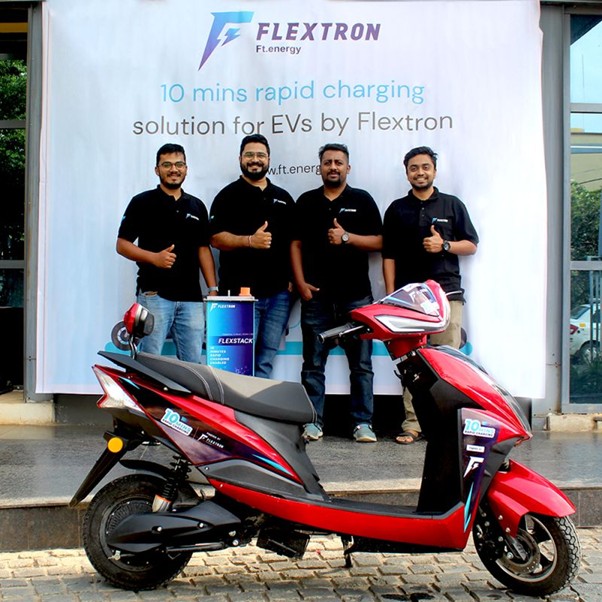Flextron, an NSRCEL-incubated startup, is redefining India’s EV landscape with charging solutions that power the future of sustainable mobility
When the world was still debating the pace of electric mobility, Flextron was already building the technology to make it faster, smarter, and more accessible. Founded in 2021 by Ameen Khan and his team, Flextron, an NSRCEL-incubated startup, emerged from a shared vision to remove the barriers that slowed EV adoption and make electric charging as seamless as refueling a car.

What began as a group of engineers experimenting with compact charging solutions in 2020, soon became one of the country’s promising clean-tech startups. Within a year, Flextron had developed 3.3 kW EV chargers with built-in SIM-based mobile connectivity, a feature that allowed real-time monitoring, control, and remote diagnostics, bringing intelligence to the charging experience.
But for Ameen and his team, innovation wasn’t just about building outstanding technology; it was about solving real problems.
“Many startups build technology because they have an idea, but not all products find their market fit. We spent time with customers, learning what they needed, and that’s when we started building something they were ready to invest in,” he reflects.
That philosophy became Flextron’s foundation: customer empathy backed by data-driven design. Instead of rushing to launch products, the team focused on gathering insights directly from users and fleet operators, understanding their challenges with reliability, affordability, and compatibility. This helped them refine their hardware and software to address pain points like inconsistent charging performance and lack of real-time data visibility, a move that proved crucial in helping them achieve a strong product-market fit within their first year of operations.

Today, Flextron’s portfolio is expanding to meet the demands of India’s growing electric mobility ecosystem. Its rapid charging solutions are designed for both personal and commercial applications, integrating smart connectivity features that enable fleet management and predictive maintenance. Beyond chargers, Flextron’s ecosystem supports the broader EV transition, from energy optimization tools to partnerships that enable sustainable grid integration.
When asked how the NSRCEL Sustainable Mobility Incubation Programme helped Flextron in its journey, Ameen’s response was quick. “It was not just about mentorship or funding; it was about perspective,” he said. “The programme helped us understand how to position our technology within a sustainable ecosystem. It connected us to mentors who had seen similar journeys and could guide us beyond just product development into areas like policy, business design, and scaling.”
Through NSRCEL’s platform, Flextron gained exposure to industry partnerships, investor networks, and a community of founders tackling similar challenges in sustainability and clean tech. That support ecosystem, he emphasized, helped the team move from prototype to product-market fit with greater clarity and speed.
As our conversation came to a close, Ameen shared his thoughts for aspiring founders looking to enter the sustainability and EV space: “Spend time with your customers; don’t build for what you think is right, build for what they need. Technology will evolve, but understanding people will always be your biggest advantage.”
Flextron’s story is still unfolding, but its direction is clear: building technology that doesn’t just make charging faster but makes the future of mobility smarter, greener, and deeply human-centered.
